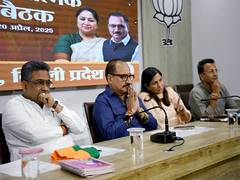Intense summer heat in Delhi pushes power demand to all-time high of 7,717 MW
New Delhi, May 21 (PTI) Delhi’s peak power demand reached an all-time high of 7,717 MW on Tuesday afternoon amid intense summer heat, Discom officials said.
According to the State Load Dispatch Centre (SLDC), Delhi, real-time data, the peak demand of the city broke all previous records.
It reached 7,717 MW at 3.33 pm, they said.
Delhi’s previous all-time high peak power demand was recorded at 7,695 MW on June 29, 2022, officials said.
The national capital is reeling under intense heat with a steady temperature rise. The India Meteorological Department (IMD) has predicted heat wave conditions in many parts of Delhi and severe heatwave conditions in some areas.
It has also issued a red alert for the next four days.
According to the seven-day forecast, the maximum temperature will be in the range of 44 to 47 degrees Celsius.
The minimum temperature on Tuesday settled at 30.7 degrees Celsius, four notches above normal, according to the IMD. The maximum temperature of the day is expected to be around 45 degrees Celsius.
The discom officials have projected the city’s peak power demand to cross 8,000 MW this summer to top around 8200 MW.
On Monday Delhi’s peak power demand clocked 7,572 MW – highest ever in May in Delhi. The previous peak power demand for May was 7,438 MW, recorded in 2023, discom officials said.
A spokesperson of BSES discoms BRPL and BYPL said the peak demand was met successfully in their respective distribution areas. On their part, BRPL and BYPL successfully met the peak power demand of 3,404 MW and 1728 MW in their respective areas.
He said the BSES has made advance arrangements to meet the soaring power demand through power purchase agreements and network strengthening through substantial investment.
Around 2,100 MW of green power to play an important role in powering Delhi during the summer months, he added.
Tata Power Delhi Distribution Limited (TPDDL) successfully met the peak power demand of 2,225 MW in its distribution area of North Delhi without any outages and network hindrances, said a spokesperson of the discom.
The power demand can be attributed to weather conditions that lead residents to use more air conditioning and cooling appliances.
Air conditioning can contribute to 30-50 per cent of the total annual energy consumption of any domestic or commercial establishment, discom officials said.






